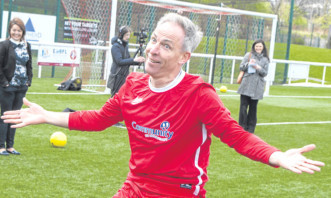If the opinion polls are to be believed, most of Scotland’s highest profile MPs will lose their seats and their political careers in two weeks’ time.
Those under threat include Lib Dem Treasury Secretary Danny Alexander, Labour’s shadow foreign secretary Douglas Alexander, former Lib Dem leader Charles Kennedy, shadow Scottish secretary Margaret Curran and Scottish Labour leader Jim Murphy.
In all these constituencies in fact, in most of Scotland’s 59 Westminster seats the SNP is poised for record swings to their candidates, according to Conservative donor Lord Ashcroft’s latest poll.
The dominance of Unionists in all but four of the country’s local authorities in the independence referendum will be obliterated and Nationalists could end up representing nearly the whole of Scotland in the Commons.
Yet if there were another independence ballot tomorrow it is by no means certain the separatists would win.
Voters who back one of the other parties are alarmed but this is how our first past the post electoral system works.
Seasoned campaigners have begun to plead with the electorate to come to its senses, citing illustrious political records and longevity.
Who would voters rather have, a Nationalist with a single issue agenda, or the Labour or Lib Dem alternative (Tories still don’t get much of a look in), who has defended local interests for years?
Highland MP Danny Alexander, fighting to save Inverness, Nairn, Badenoch and Strathspey against “a bunch of Nationalists who want to carry on a fight for independence by the back door”, claims he has delivered for his area.
So does Margaret Curran in Glasgow East but she is having to contend with Yes campaigner and the Scottish Presiding Officer’s niece Natalie McGarry.
During a radio phone-in, McGarry could not name a single progressive policy of her party’s, except scrapping university tuition fees, which has been shown to favour the middle classes.
She is slicing away at Curran’s lead not through a clever dismantling of Labour’s arguments but by turning a blind eye while her supporters harass the MP in the constituency (as reported here last week).
This is not the only seat where the Nationalists have drafted in relative unknowns, a motley mix of student activists and green-about-the-gills Yes men and women.
Labour stalwart Douglas Alexander may not be everybody’s cup of tea but imagine his humiliation if he loses Paisley and Renfrewshire South on May 7 to Mhairi Black, a 20-year-old undergraduate with an occasional penchant for foul-mouthed tweets. How can we complain, though, if people vote for her, or one of the SNP’s other questionable choices? This is democracy in action, like it or not.
Many believe that the Nationalists are making headway in the former strongholds of the Unionist parties for the very reason that several of their candidates are new to the political game.
Disillusionment with the establishment ranks high on voters’ list of grievances and they would prefer almost anyone to a familiar old hand, however tirelessly he or she has worked on their behalf.
Douglas Alexander and several of his generation in the Labour party are also paying the price of setting up the Scottish parliament then disappearing to London.
This has not gone unnoticed by the Scottish electorate and may account for the large numbers now turning to the Nationalists, even though they don’t necessarily want separation.
Whether or not individual Labour, or Lib Dem or indeed Tory MPs (singular in the latter’s case) have devoted themselves to their constituents, they are struggling to defend, in some cases, their very large majorities.
Of course, they won’t be the first to fall foul of the fickle electorate.
In 1922, Winston Churchill, then a Liberal, may have held high office as Home Secretary and First Lord of the Admiralty but the voters of Dundee opted for the prohibitionist Neddy Scrymgeour.
History judges them now but they got what they wanted.
